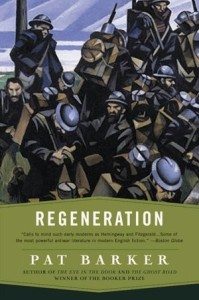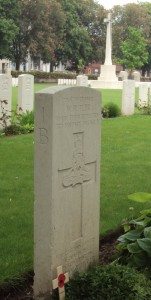Tales From the Trenches: Literature from the First World War
[dropcap]T[/dropcap]his year marks the centenary anniversary of one of the most brutal wars in the history of the world. But how can we understand a conflict that happened so long ago on such an epic scale? Sometimes the intimate stories of individuals helps us comprehend the tragedy better than text books…
Regeneration by Pat Barker
 It’s easy to look back at the First World War, a hundred years removed from the event, and declare ourselves “anti-war”. The jingoism surrounding the outbreak of international conflict in 1914 now seems, above all else, heartbreakingly misguided. For this reason, creating representations of the war in the twenty-first century is often contentious: writing convincingly about the devastation of a generation years before your own is a difficult art to master.
It’s easy to look back at the First World War, a hundred years removed from the event, and declare ourselves “anti-war”. The jingoism surrounding the outbreak of international conflict in 1914 now seems, above all else, heartbreakingly misguided. For this reason, creating representations of the war in the twenty-first century is often contentious: writing convincingly about the devastation of a generation years before your own is a difficult art to master.
For me, Pat Barker’s Regeneration succeeds because it does not accept a standard, overly simplistic pro/anti-war dichotomy. It opens with Siegfried Sassoon’s “Declaration of a Soldier”, one of the most vehemently anti-war texts ever published in Britain: yet in the novel, Sassoon’s decision to conscientiously object is far from straightforward. Away from the Western front, he is not only haunted by the horrors he has seen, but by the guilt of having left his platoon behind. Similarly Dr Rivers, the novel’s central figure, initially believes that the war must be fought to its bitter end for the sake of future generations; a mantra that is quickly brought into question by the trauma endured by each new patient.
It is in these descriptions, both of the war itself and of the methods used to “cure” the traumatised soldiers, that Barker’s prose is at its most brutal. In marrying fictionalised versions of real-life figures – Sassoon, Rivers, Wilfred Owen – with characters of her own imagination, and setting the novel in a psychiatric hospital away from the frontline, Barker masterfully recreates the human world outside of history book statistics. The novel may question the heroism of the war itself, and of a government which sanctions torturous methods of therapy, and views the mentally traumatised as “broken”; but it never questions the value of the men whose lives it follows.
Regeneration is not a sanctimonious tract for modern pacifism, and it refuses to simplify or sanitise the war for artistic purposes. Instead, it is a study of human emotions beneath unimaginable suffering. Its sentiment might be fundamentally anti-war, but Barker demands a much greater interrogation of what this means for the humanity of her characters. For a modern readership, this is surely the perfect novel of remembrance: one which refuses readers the “callous complacency” Sassoon so despised.
Fiona Farnsworth
[divider]
The Green Fields of France, a song by Eric Bogle
 I first listened to this song during a trip to The Somme, and as I looked out over the sea of white stones, for me the song told the truth about the Great War.
I first listened to this song during a trip to The Somme, and as I looked out over the sea of white stones, for me the song told the truth about the Great War.
It is just as much poetry as the writing of Sassoon or Owen because, after hearing it, I truly appreciated the sacrifices the men who fought made. In the song, the speaker is sitting next to the grave of “young Willie McBride”, wondering about his life and his experiences in the war. The song addresses all possibilities, saying “I hope you died quick and I hope you died clean…or was it slow and obscene?” The fact that the song does not try to hide the more violent aspects of the war is another feature which makes it so powerful. It also addresses how the war affected many people left at home, asking “did you leave a wife or sweetheart behind?” It is the devastating truth that there probably wasn’t one person who did not lose someone during the war, the song reminding us that “a whole generation were butchered and damned”.
Perhaps one of the most heart-breaking lines is when the speaker asks “or are you a stranger without even a name?” It is a sad reality that many bodies of the soldiers were not found or were unidentifiable. However, the part which impacted me the most was the final verse which deals with the futility of the war. The speaker asks “did you really believe that this war would end wars?”, referring to US President Woodrow Wilson’s words.
Of course, this was not the case. The song explains, “the killing and dying it was all done in vain…it all happened again”. For me this is the most poignant part of the song because it describes how awful the Great War was but also reminds us that we have not learnt our lesson and people continue to die fighting for their country.
Lucy Skoulding
[divider]
The War Diaries of Gunner S. Allcock, R.F.A.
 When we think of the First World War, we think of the Lost Generation, the trenches, the heroism and heartbreak, and the disastrous foreshadowing of the next great conflict that would engulf the world decades later. It would be easy to think that the first-hand writings of the conflict would reflect the shocking honesty of Sassoon or Owen. But not every soldier was as eloquent, or as morose, as their more famous counterparts.
When we think of the First World War, we think of the Lost Generation, the trenches, the heroism and heartbreak, and the disastrous foreshadowing of the next great conflict that would engulf the world decades later. It would be easy to think that the first-hand writings of the conflict would reflect the shocking honesty of Sassoon or Owen. But not every soldier was as eloquent, or as morose, as their more famous counterparts.
The Nottinghamshire Archives has a collection of diaries written by soldiers in the trenches, providing a window into the everyday lives of the people directly involved in the fighting. One of these is the collection of diaries written by Gunner S. Allcock. Not much is known about him, but a post-script written by a relative explains that he survived the War, only to die not long after due to the lingering effects of being gassed on the Western Front.
Reading the diaries, which begin in mid-1916 and continue until his honourable discharge from the Army in April 1918, is an overwhelming experience, not least because you know you are reading the last substantial writings of a man who is not going to make it beyond a few months after the last entry. You go in expecting to read about death, about the constant dangers being faced and maybe about a young man missing his family. Instead, Gunner Allcock’s diaries are brimming with a sincere hope for a brighter future.
In between several ordinary entries about making tea and receiving Christmas presents – the mundaneness almost convincing the reader that this is not the writing of a man in the midst of the Great War – he keeps talking about his pride at fighting for a better tomorrow, one he seems convinced that he himself will live to see. The only hint of uneasiness about his position is when he refuses to go into military details, but this could simply be a precaution in case his diary was taken by the other side.
Gunner Allcock’s diaries are not literary masterpieces, but the remnants of an age that we simultaneously know so little of and yet can never forget. His work reminds us that the War was not always seen through a lens of despair, which only makes his life all the more tragic.
Ibtisam Ahmed
Comments